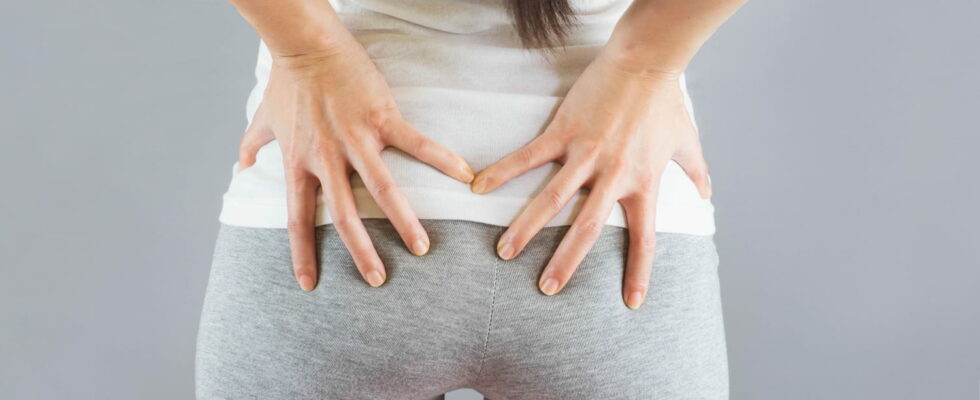Degenerative disc disease (lumbar, cervical, stepped) is a process of wear of one or more discs between the vertebrae, most often at the level of the spine.
We are talking about degenerative disc disease when the discs between the vertebrae gradually deteriorate. We speak of cervical disc disease when the discs concern spine. What disease causes degenerative disc disease? How does degenerative disc disease develop? Is that bad ? How to cure degenerative disc disease?
What is degenerative disc disease?
Discopathy East progressive deterioration of the intervertebral discs, discs located between two vertebrae of the spine. These discs act as a shock absorber. When they wear out, they become less flexible and play their role of shock absorber less well.. “Disc disease can affect one or more discs, explains Dr. Steffen Queinnec, orthopedic surgeon. The one most subject to this degeneration is located at the lumbosacral junction between the L5 and S1 vertebrae“.
Significant disc disease can lead to the development of local osteoarthritis. The disease comes on slowly and gradually and can affect any disc. We can thus speak of:
- Lumbar disc disease
- Dorsal disc disease
- Cervical disc disease
What is degenerative cervical disc disease?
We speak of cervical disc disease when the intervertebral discs concerned are those of the spine.
What is staged degenerative disc disease?
When several intervertebral discs are affected by a degenerative process, we then speak of staged disc disease.
What are the symptoms of degenerative disc disease?
The main symptom of degenerative disc disease is back pain. Its location can vary according to the level of the attack:
- If the disc disease is cervical: there will be pain in the neck which may radiate to the back of the shoulder blades or into the arms. and which can be associated with a loss of sensitivity, tingling or even motor difficulties
- If the disc disease is dorsal: there will be pain in the upper back. Back pain can lead to functional difficulties, such as tingling, loss of feeling in the legs or buttocks, or problems walking.
- If the disc disease is lumbar: there will be pain in the lower back
How long does degenerative disc disease last?
Episodes of low back pain, back pain and neck pain can last from 15 days to 3 months. Unfortunately, they can become more frequent and become chronic. In some people, the pain is so severe that it constitutes a real handicap in personal or professional life.
What causes degenerative disc disease?
Several factors can promote disc disease:
- Age is the most important factor. Inevitably, aging causes the gelatinous nucleus to dry out and the cartilage to harden and thin.
- Certain genetic factors seem to have an impact
- Certain pathologies, for example joint pathologies or too frequent herniated discs
- Overweight due to increased disc wear under body weight
- Microtraumas and traumas of the spine
- Lack of physical exercise. The muscles are weaker and the spine is therefore less well supported
- The hygiene of life, for example the tobacco addiction and a bad food support the dehydration of the discs.
- Overuse on a daily basis, bad gestures and bad habits are important risk factors
- Surgical history such as nucleolysis, herniated discs
Diagnosis of disc disease is made using a physical examination during which the doctor will seek to assess the flexibility and mobility of the back, but also to detect any nerve damage, common in cases of advanced degeneration. “This clinical examination will be supplemented mainly by A radiograph (study of anatomy, bone morphology, balance) or by an MRI (study of the spinal disc and canal)recalls the orthopedic surgeon. It is also necessary to measure the impact of this on the quality of life of the patient.“.
The treatment of discopathies consists mainly in relieving pain during crises. For this, you can:
- Prescribe painkillers, anti-inflammatories and muscle relaxantsassociated with rest.
- Prescribe corticosteroid injections when the pain is not relieved by medication.
- Prescribe physiotherapy sessions: movement and maintaining an activity are essential elements.
When to operate on degenerative disc disease?
Surgery is considered when medical treatments and physiotherapy rehabilitation do not relieve chronic pain, and when there is an impact on quality of life. “It is a functional surgery, allowing to improve, in an appreciable way the situations, but without “true cure” strictly speaking.“, insists our interlocutor. Several techniques exist:
► arthrodesis which consists in blocking the painful level(s) in order to limit the movements of the affected disc. This allows the disk to be removed and replaced. In a few months, this operation results in the welding of the vertebrae concerned together and therefore reduces the pain.
► Arthroplasty Who consists of replacing a damaged disc with a prosthesis (artificial disc).
“In the aftermath of an intervention, it will be necessary to keep the habits taken in rehabilitation, on the posture and the use of his back. Surgery is indeed not a “right pass” to misuse your back. Sometimes, it will be necessary to think about a change of professional attitude, even a reclassification, and also to change certain sporting habits.“, continues the doctor.
What prevention to avoid degenerative disc disease?
Discopathy can be prevented by practicing a physical activity, guaranteeing a good musculature of the back, but also by not smoking. “Care must be taken to adapt your workstation, the seat, repetitive gestures, the position of the screens (especially for the cervical spine“, concludes Dr. Queinnec. In addition, back hygiene advice teaches the patient how to limit the stress on his spine on a daily basis by adopting good postures.
What diet to avoid degenerative disc disease?
Favoring alkaline foods (vegetables, potatoes, etc.) and avoiding acidifying foods (sweets, meat, etc.) can reduce inflammatory pain, as acids aggravate inflammation. “It is important to maintain a balanced diet and avoid weight gain.advises the doctor.
Thanks to Dr Steffen Queinnec, orthopedic surgeon at Clinique Geoffroy Saint-Hilaire (Paris 5th)
